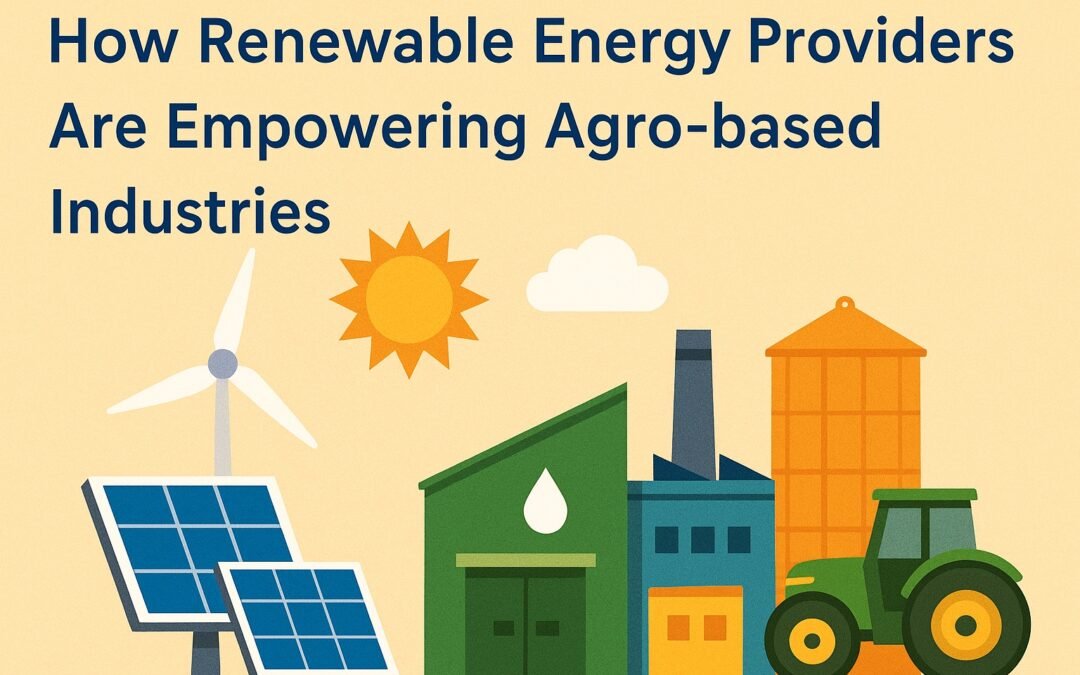Overview
Food processing, dairy, sugar, and biofuel manufacturing are examples of agro-based sectors that rely significantly on energy. These sectors have historically depended on fossil fuels to run their operations, which has resulted in significant carbon emissions and environmental damage. However, renewable energy has become a sustainable and financially feasible option as a result of growing awareness of climate change and the rising expense of conventional energy sources. The shift of agro-based businesses toward cleaner energy solutions is largely being driven by renewable energy sources. Numerous renewable energy events in India, such as renewable energy shows and the forthcoming renewable energy conference 2025 India, are showcasing and celebrating this shift.
1. Renewable Energy’s Importance for Agro-Based Sectors
High power usage, unstable energy pricing, and erratic grid connections in rural areas are some of the energy-related issues that agro-based enterprises must deal with. In India, where the agricultural industry employs a sizable portion of the workforce and sustains the economy, these issues are particularly pressing. Including renewable energy contributes to:
- Cutting back on reliance on fossil fuels
- Reducing operating expenses
- Improving the dependability of energy in semi-urban and rural regions
- Improving environmental sustainability and reducing carbon emissions
Agro-industrial operations in rural areas are especially well-suited for renewable energy sources like solar, wind, biomass, and biogas. At the Renewable Energy Conference 2025 India and at renewable energy fairs, these subjects are at the forefront of conversations.
2. Important Renewable Energy Options Strengthening Agro-Based Sectors
a. Solar Power
One of the most widely available renewable energy sources is solar power. Solar panels are used in agro-based sectors for:
- Solar-powered watering systems
- Grain and agricultural solar dryers
- Milk chilling machines that run on the sun
- Solar-powered lighting and machinery
At renewable energy exhibitions in India, where cutting-edge off-grid and hybrid solar models are displayed for rural deployment, the country’s expanding solar capacity has been the main attraction.
b. Biogas and Biomass
Biogas and biomass are organic waste products from farming. Energy can be produced from them by:
- Boilers that burn biomass
- Plants that use anaerobic digestion
- Units of combined heat and power (CHP)
This circular economy solution and waste reduction are provided by this renewable energy paradigm. Leaders in the field provide state-of-the-art biomass technologies that may be easily incorporated into agro-based operations at renewable energy shows.
c. Energy from Wind
Despite being less frequently utilized in agro-industries because of location and space limitations, wind energy is important in areas with strong wind potential. Backup energy and power needs can be met by small wind turbines.
d. Ethanol and Biofuel Plants
Ethanol production machines, which turn grains and molasses into gasoline, are increasingly being installed in sugar mills and grain processing enterprises. These facilities’ contributions to energy generation and agricultural sustainability are frequently discussed and showcased at the Renewable Energy Conference 2025 India.
3. Advantages of Using Renewable Energy in Agro-Based Sectors
Using renewable energy has several advantages:
- Cost savings: Lower electricity and fuel costs.
- Energy Independence: Reliance on diesel generators or unstable grid supplies is reduced.
- Impact on the environment: A notable reduction in greenhouse gas emissions.
- Waste Management: By using agricultural residues, biogas and biomass plants help to reduce waste.
- Employment Creation: In rural areas, installing and maintaining renewable energy systems generates job opportunities.
At renewable energy events in India, which seek to close the gap between innovators and agro-industrial enterprises, the aforementioned results are presented in detail.
4. Government Programs and Assistance with Policies
Agro-based businesses are the main benefactors of India’s large policy-level commitments to renewable energy. Important projects consist of:
- PM-KUSUM Scheme: Encourages irrigation pumps that run on solar power.
- The mission of the National Bio-Energy is to concentrate on biogas and biomass solutions.
- The FAME Scheme promotes the use of clean energy in agri-product logistics and transportation.
In order to further empower agro-industries, the Renewable Energy Conference 2025 India will showcase government accomplishments and offer a forum for policy discussions.
5. Case Studies: Effective Integration of Renewable Energy in Agro-Based Sectors
Case Study 1: Gujarat’s Solar-Powered Dairy
By installing solar power systems throughout its processing facilities, Amul Dairy was able to reduce energy costs by 25% and minimize carbon emissions by more than 400 tons per year.
Case Study 2: Punjabi Biogas Plant
By turning its leftover molasses into biogas, a Punjabi sugar mill was able to meet 60% of its energy needs while drastically lowering pollution.
Case Study 3: Maharashtra’s Biomass Power
In rural Maharashtra, a grain milling facility uses rice husk and agricultural waste to function entirely on a biomass-based power unit.
Across the nation, renewable energy exhibits have highlighted these examples.
6. The Function of Suppliers of Renewable Energy
Providers of renewable energy are essential to this change. Among their responsibilities are:
- Creating customized solutions to meet agro-based demands
- Offering installation and technological services
- Providing lease and financing options
- launching awareness-raising initiatives in rural regions
In order to build a strong clean energy ecosystem, providers have the chance to network with agro-industrialists and policymakers at renewable energy events in India.
7. Future Directions in Agro-Industrial Renewable Energy
a. Intelligent Energy Monitoring Devices
Predictive maintenance and efficiency are enhanced via IoT-based energy use monitoring.
b. Renewable Hybrid Systems
maximizing the availability of energy by combining solar, wind, and biogas.
c. Community Power Models and Microgrids
local energy networks operated by farmer associations or cooperatives.
d. Technologies for Energy Storage
Technological developments in battery storage guarantee agri-processing facilities have access to energy around-the-clock.
The renewable energy conference in India in 2025 will feature demonstrations of many of these innovations.
8. Difficulties and Resolutions
Notwithstanding the advantages, agro-industries confront difficulties like:
- High Initial Cost: This can be mitigated by government subsidies and financial plans.
- Lack of Knowledge: Exhibitions and events centered around renewable energy contribute to education.
- Technical Skill Gap: Energy suppliers’ efforts to increase capacity can be beneficial.
9. Renewable Energy Events’ Significance in India
Various renewable energy exhibitions and conferences like the Renewable Energy Conference 2025 India provide a venue for:
- Showcase emerging technology.
- Exchange best practices.
- Make connections with manufacturers, legislators, and investors.
- Create alliances between agro-industrial customers and energy suppliers.
These meetings play a key role in expanding the use of renewable energy in the agriculture industry.
Final Thought
For agro-based companies, the move to renewable energy is not merely a fad; it is a necessity. Sustainable agriculture and industrial processes are undergoing a quiet revolution in India because to the assistance of renewable energy suppliers, legislative frameworks, and awareness initiatives. A greener, more efficient future for agro-industries is indicated by the conversations and developments at renewable energy events in India, particularly at the Renewable Energy Conference 2025 India. The industry can guarantee economic expansion, energy stability, and environmental sustainability by adopting renewable energy, opening the door to a really green economy.




